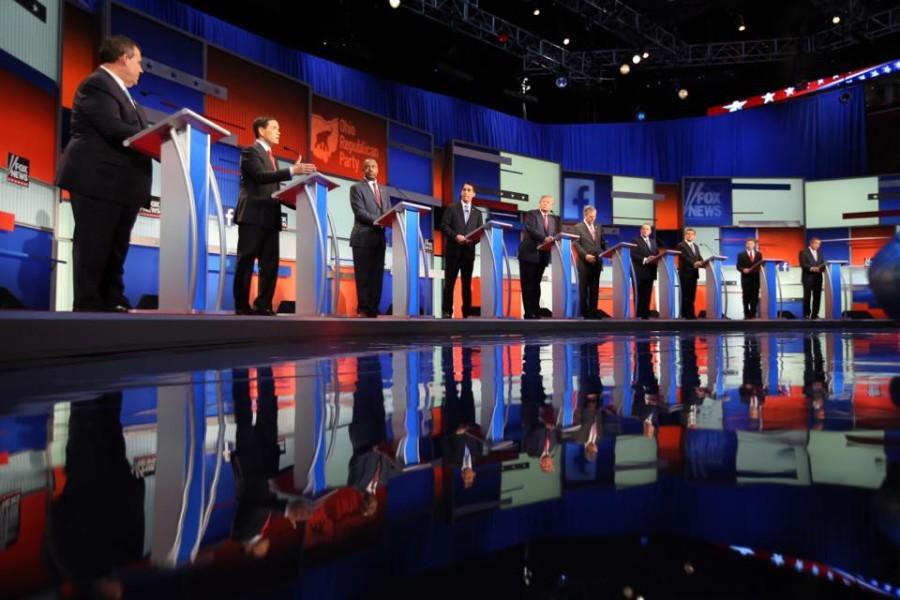Democrats and Republicans Prepare for the 2016 Presidential Election
October 24, 2015
With President Obama’s approval rating hovering around 45% and a highly unpopular Republican congress, many Americans are looking to the 2016 presidential election as an opportunity to change the nation for the better. After two terms in office, President Barack Obama will leave the White House in January 2017, and both major political parties are preparing to hold primary elections throughout the United States to find their presidential nominees. In the past few months, the race has proven to be very exciting as the assumed Democratic and Republican frontrunners have faced serious challenges from outsiders. With state primaries and caucuses starting in less than 4 months, candidates on both sides are campaigning in full force in the early Primary states, hoping to win big.
Within the Republican Party, President George W. Bush’s brother Florida Governor John Ellis “Jeb” Bush was largely considered to be the GOP establishment’s favored candidate in early 2015, however Jeb has proven highly unpopular with Republican voters due to his connection with his unpopular brother and less than stellar oratory skills. Although he is certainly a serious contender, Jeb is struggling to energize voters and distinguish himself from the rest of the Bush family – he currently sits at 5th place in the polls. Eclipsing the entire Republican field in the polls is business tycoon Donald Trump, who has considered running in the past and finally stepped up this election cycle. However, Trump’s standing is precarious, he has alienated both women and minorities after making disparaging comments about both groups, and his lead over Dr. Ben Carson is growing slimmer by the day. Dr. Carson himself is the darling of the Republican religious right-wing, and has taken very conservative stances on issues such as marriage equality and abortion. However, Carson is very unpopular with more moderate voters due to his hardline views, especially after he recently commented that a Muslim would not be fit to be President of the United States.
Many candidates trail below Trump and Carson, struggling to be recognized in a sea of 15 (earlier 17) candidates. Other notable candidates include Ms. Carly Fiorina, the ex-CEO of HP who gained the media’s spotlight after the first Republican debate, Florida Senator Marco Rubio, a Cuban American and the youngest presidential candidate in both parties, and Texas Senator Ted Cruz, a Canadian-born Tea Partier who has taken hardline stances similar to Dr. Carson. Meanwhile, candidates such as Piyush “Bobby” Jindal and Lindsey Graham sit at less than 1% in the polls and are hopeful for a meteoric rise like that experienced by Ms. Fiorina, but have inevitably been bogged down in a sea of obscure candidates.
On the Democratic side, New York Senator Hillary Clinton entered the race as the clear Democratic frontrunner, especially after her term as Secretary of State and bid for the Democratic nomination in 2008. However, she has struggled surpass a scandal surrounding her emails and Congress’s continued investigation of the Benghazi terrorist attacks. Moreover, Clinton is generally seen as untrustworthy by the Democratic base and America at large, making her nomination less than certain. Challenging Clinton from the left is Vermont Senator Bernie Sanders, a self-proclaimed Democratic Socialist who has been championing a grassroots movement among students and young people. Although Clinton has a large lead in the polls, Sanders is polling at 25% within the Democratic base and has a large base of support in the early primary state New Hampshire. At the bottom of Democratic polls is Maryland Governor Martin O’Malley, who has struggled to make a name for himself while caught in between two political juggernauts, and seems to be more interested in bringing the issues of green energy and global warming to the forefront of the campaign rather than seriously running.
With the Iowa Caucus rapidly approaching, four candidates have already dropped out of the race early, recognizing their slim chances at winning a single state, and will likely be followed by several more in the upcoming months. The 18 candidates that remain, however, are campaigning vigorously nationwide and trying to drum up support within their party’s voters. Only time will tell which candidate will be sworn in next Jauary

